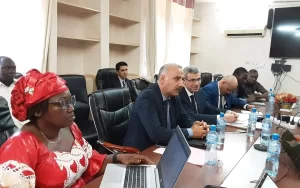Mali takes strategic leap toward food sovereignty with Russian-Backed pasta plant

In a significant boost to its agricultural industrialization agenda, Mali has secured a landmark investment from Russian agribusiness firm DIMAS to establish a state-of-the-art pasta production facility. This transformative project marks a crucial step in President Assimi Goïta’s vision for economic self-reliance and food security.
Addressing critical national needs
The new manufacturing plant will:
• Meet growing domestic demand for affordable pasta products
• Add value to locally sourced wheat and other cereals
• Reduce Mali’s $50 million annual pasta import bill
• Create over 200 direct jobs in food processing and related sectors
Economic transformation in action
Beyond immediate food production benefits, the project promises to:
✓ Develop technical skills through technology transfer
✓ Stimulate upstream agricultural production
✓ Generate downstream distribution opportunities
✓ Establish a model for future agro-industrial partnerships
Strategic alignment with national priorities
The initiative perfectly complements Mali’s:
- Import substitution industrialization strategy
- South-South cooperation framework
- Agricultural value chain development program
- Job creation targets under the Transition Roadmap
A New paradigm in development partnerships
This Russian investment represents more than foreign capital – it embodies Mali’s evolving approach to:
• Prioritizing production over aid
• Leveraging strategic alliances for technology transfer
• Building domestic manufacturing capabilities
• Creating resilient food systems
Industry analysts highlight the plant’s potential to become a regional hub, eventually supplying neighboring Sahel countries. With construction slated to begin in Q3 2025, the project demonstrates how Mali is translating its agricultural potential into concrete industrial development – one strategic investment at a time.
This venture stands as testament to Bamako’s ability to attract meaningful partnerships that align with its sovereignty agenda while delivering tangible economic benefits for Malian citizens.
The pasta plant may well become a case study in effective import substitution strategies for developing economies.
Souley LAMINA










